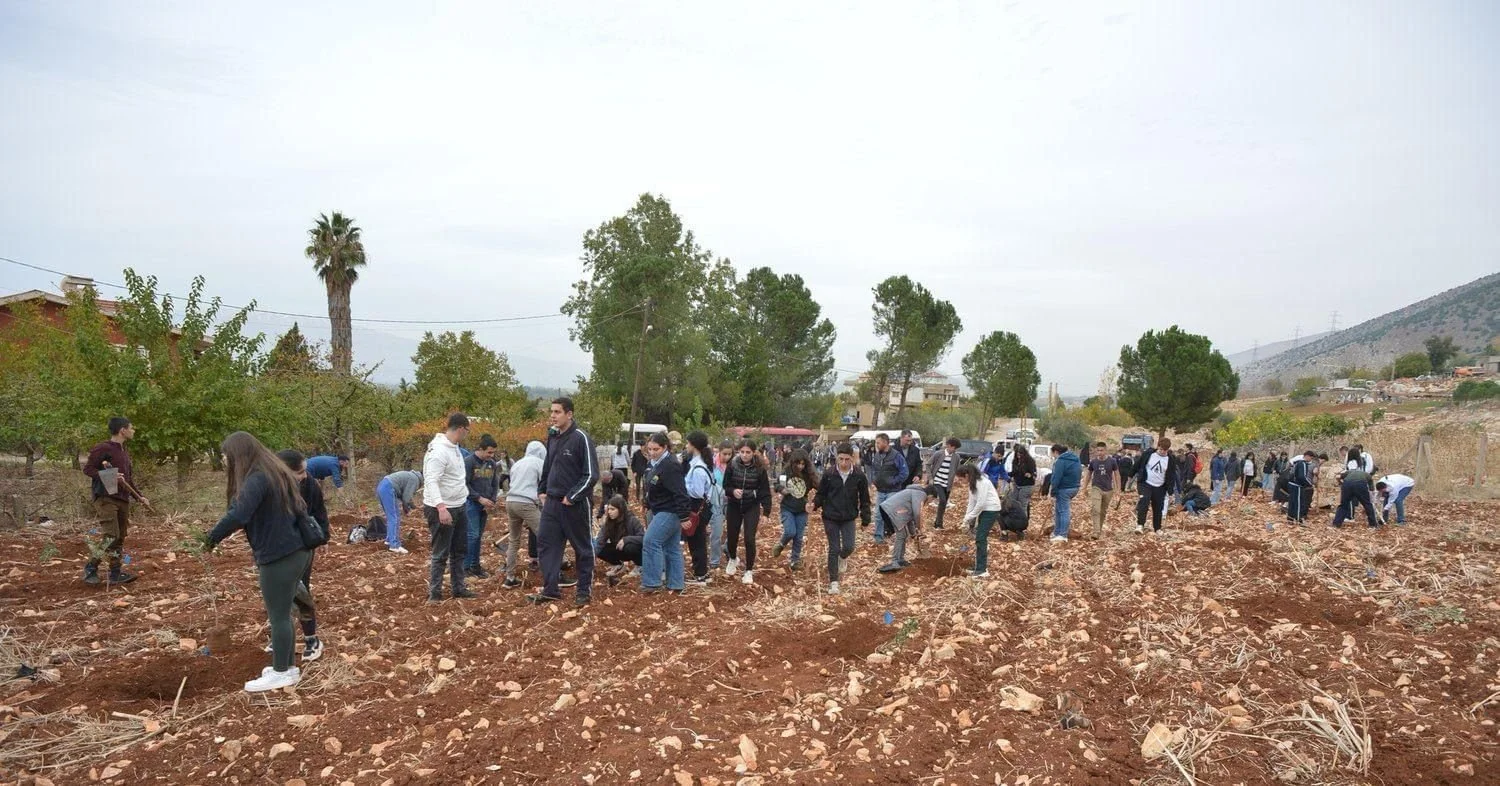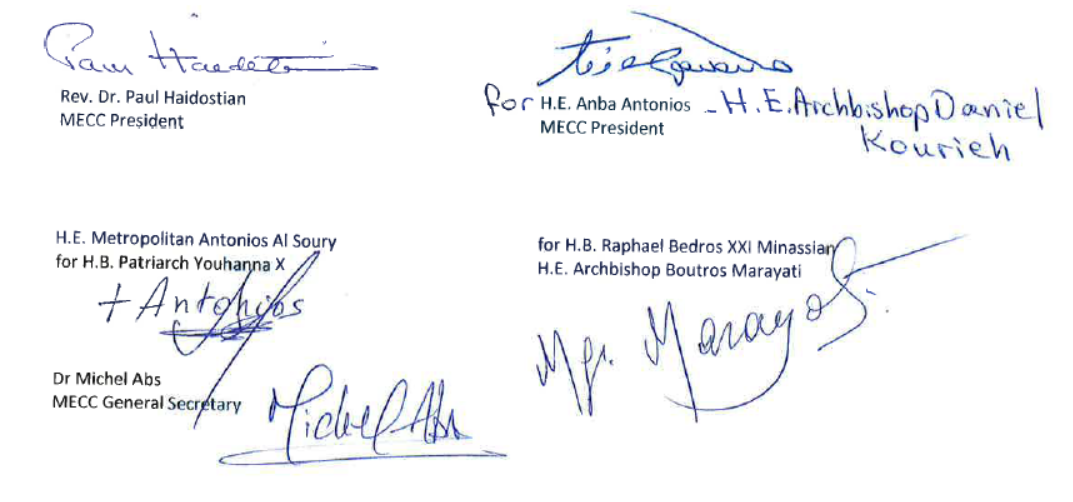Statement of the Middle East Council of Churches on Creation Care
As part of the COP28 Conference of the Parties on Climate Change held by the United Nations in Dubai between 30 November and 12 December 2023, the Middle East Council of Churches (MECC) issued a statement on creation care on behalf of the Churches of the Middle East, which MECC addressed it to the officials at the Dubai conference. In the statement, MECC calls for accelerated and radical changes based on the following principles: Global Long-Term Commitment, Just Climate Financing, Just Management of Resources, Simpler Lifestyles, Just Transitions, Church Commitment, and Church and Government Cooperation.
Below you can find the full text of the MECC statement.
We, the Churches of the Middle East, representing the four families of the Christian faith in the region, are compelled by our responsibility towards God’s creation to speak ahead of the UNFCCC’s COP28 in Dubai in late 2023. This moment, following Egypt’s presidency of COP27, is a time for greater awareness and action to counter climate change and environmental destruction in this cradle of our faith and of civilization, in our congregations and the communities we belong to.
We speak not only as leaders of the Christian community in the Middle East, but as sisters and brothers in humanity, and members of wider global families of faith in God The Creator. We base this call on our belief that the earth and everything in it were made by God, declared “good” and ultimately belong to God The Creator. In our region, we are aware of the sacredness of the soil trod by The Lord Jesus Christ, the water sanctified by His baptism in the river Jordan and the landscape that witnessed the story of our salvation. We see the harm to human, animal, and plant life that climate change, driven by human action, is doing to the world around us. We lament the damage that was done through unsustainable actions and repent of our selfishness and carelessness in our duty to care for God’s creation.
We therefore call for accelerated and radical changes based on the following principles:
1. Global Long-Term Commitment: The climate emergency is a global threat requiring global response, imagination, and long-term commitment. It will not be solved whilst countries remain focused on national self-interest or short-term political perspectives. We were greatly encouraged by the establishment of a loss and damage facility at COP27 and call on the nations of the world to commit greater funds to this facility, and a willingness to take moral responsibility for their contribution to this crisis.
2. Just Climate Financing: We recognize that, whilst further ambition to reduce emissions is necessary for all, there is a heavier responsibility upon major historic and current emitters of greenhouse gases to assist with adaptation and mitigation. We call upon the nations of the world for just financing of climate action and sharing of expertise, so that developing nations do not have to choose between indebtedness and climate-induced poverty. This is necessary, not only to address extreme weather events but also slow onset disasters, including desertification and drought, sea-level rise and coastal flooding, threats to food security and biodiversity loss amongst others, within a region already facing much upheaval and human migration.
3. Just Management of Resources: Across our region, we see how conflicts restrict the capacity to regulate natural resources. This reduces food security, impacts livelihoods, and prevents climate adaptation. Climate justice does not exist in isolation. Political and economic justice with civil rights for all are prerequisites for effective climate responses. We call on the international community to do more to resolve regional and internal conflicts in the Middle East, for the sake of the whole planet. Indigenous people groups are particularly harmed by these conflicts, particularly the Palestinian people and those who maintain a pastoralist and nomadic culture. We shall prioritize the needs and voices of those most affected by climate change and ensure their participation in decision-making processes.
4. Simpler Lifestyles: We support appropriate technological innovations and renewable energy production. However, as Christians, we also believe that resource-intensive lifestyles are instrumental in causing the climate crisis. We call on all people of faith to re-examine our relationship with nature, reflect on scarcity and abundance, and rediscover that quality of life does not consist in the abundance of material possessions. We must reflect Jesus’ approach to wealth, adopting simpler lifestyles and fostering greater equality between all people. Our own repentance should include fasting from the overuse of natural resources and contemplating the role of consumer goods in the climate crisis. We call on governments in our region and their partners to implement a holistic and circular economy, where we reduce waste and take greater care of precious and finite resources.
5. Just Transitions: As we seek a world that is simpler and more just, we recognize that decarbonizing our economies requires training and investment to create sustainable livelihoods for all. Just transition is a key part of weaning ourselves off fossil fuels. As we seek renewable solutions, we are wary of new forms of injustice, such as the mining of precious metals by multinational corporations exploiting people in awful working conditions, with few benefits to the nations from which resources are being extracted. We ask that we do not replace one harmful behavior with another.
6. Church Commitment: As well as calling on nations and businesses to limit climate change to 1.5°c, we recognize our own responsibility to be a prophetic voice in living out the change we request of others. The Church can be a shining example of what is possible, and so we speak to our own communities, encouraging them to preach, pray and act on climate change, in our habits and activities, from small efforts of recycling waste and water to production of energy in our facilities, and dramatically reconsidering how we consume. We commit to continuing to promote the Season of Creation in our churches, turning faith into action, and spreading creation care in all our activities of discipleship and diakonia.
7. Church and Government Cooperation: As the Church alongside other communities of faith, we are strategically important partners in building resilience, responding to disasters and activating strategies of adaptation and mitigation. We call on national governments to increase their engagement with local faith communities in responding to the climate crisis, recognizing our roles as trusted voices with years of experience in local communities. Let us not forget that resilience as a society in responding to this great existential crisis of our time is built not only on infrastructure, but on relationships between people. The voices of vulnerable communities, including indigenous peoples, women and youth are crucial to developing accurate and coherent responses that are accepted by all.
As we stand at this critical juncture in history, we give thanks to our Creator God, who has given us this Earth to dwell in, and pray that, as stewards and guardians of His creation, we may honor that duty in a joyful manner. We pray for all COP28 delegates and policymakers, who may seek the common good, to be guided by the principles of solidarity, equity, and urgency. We pray for the wisdom and courage to make the necessary changes in our lifestyles, policies, and systems to protect our common home and build a just and sustainable world for present and future generations. Let our actions reverberate far beyond these halls, inspiring hope and determination in the face of adversity. Together, we can and must build a safer, cleaner, and more prosperous world for generations to come.


